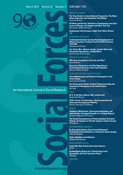-
Views
-
Cite
Cite
Kyle Irwin, Brent Simpson, Do Descriptive Norms Solve Social Dilemmas? Conformity and Contributions in Collective Action Groups, Social Forces, Volume 91, Issue 3, March 2013, Pages 1057–1084, https://doi.org/10.1093/sf/sos196
Close - Share Icon Share
Abstract
Collective action researchers have focused on injunctive norms that specify approved behavior as a panacea for collective action problems. We investigate whether descriptive norms (similar behavior) can also solve these problems. We argue that descriptive norms generate social identification, which then sustains conformity to expectations. Consequently, descriptive norms can characterize both cooperation and noncooperation, such that cooperative norms sustain successful collective action while noncooperative norms result in collective action failure. Results from two laboratory experiments supported the hypothesis that descriptive norms can sustain collective action success and failure. Further, while normative non-cooperation eroded cooperation for high contributors, normative cooperation had little affect on low contributors. This asymmetry points to a paradox: because they promote group identification, noncooperative descriptive norms can be self-sustaining, with deleterious outcomes.



